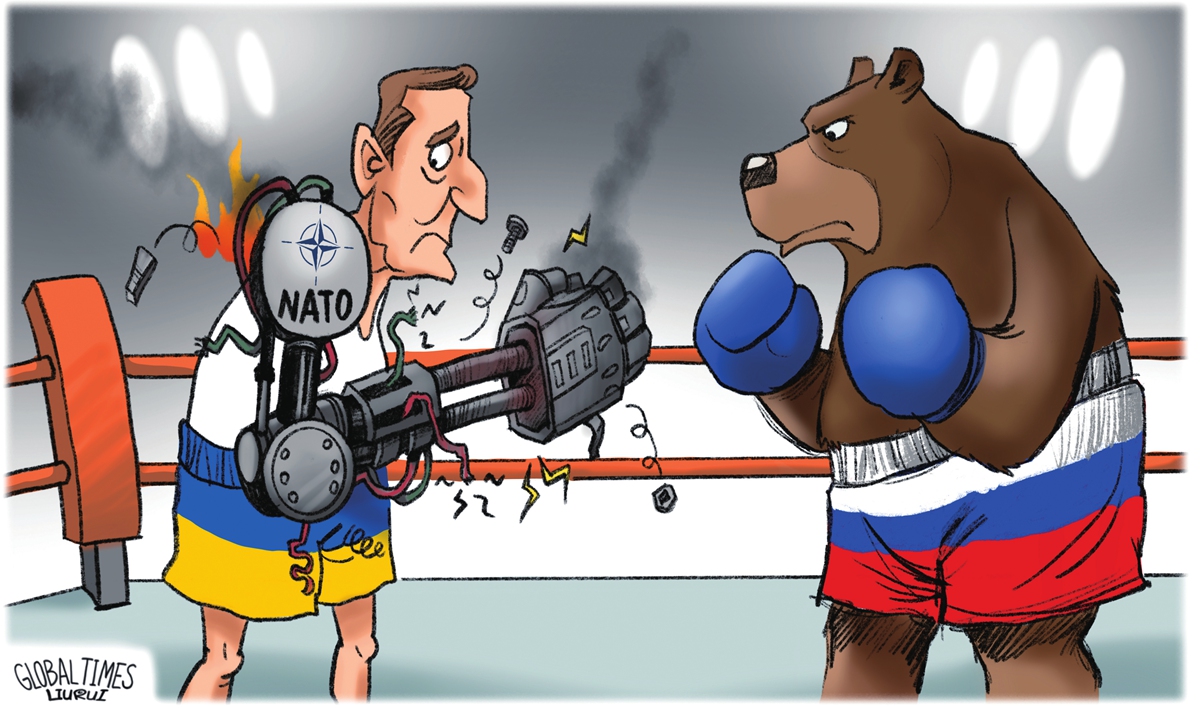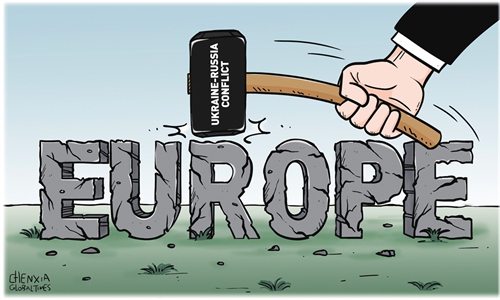
Illustration: Liu Rui/Global Times
Editor's Note:
NATO, which is constantly looking for imaginary enemies and justifying its existence by inciting confrontation, is about to hold a summit, and it also plans to extend its tentacles to the Asia-Pacific region. Behind its aggressive narrative, contradictions and divisions within NATO have become increasingly prominent. The Russia-Ukraine conflict is not going according to NATO's playbook. This series of articles will provide some clues regarding NATO's predicament. This is the first piece.
The Russia-Ukraine conflict, which was triggered by NATO's aggressive expansion, has lasted for nearly four months, during which severe sanctions have been imposed by NATO members against Russia. Ironically, the impact of these sanctions on the bloc is no less evident. Western and US media outlets report their concern over the energy and food crisis resulted from their sanctions against Russia almost on a daily basis.
There is a Chinese saying describing a poor strategy that "to injure 1,000 enemy soldiers, one loses 800 of its own," which indicates a lose-lose approach toward an adversary. It can apply to what the NATO has done against itself.
It is noticeable that the West's tone toward Russia on the ongoing crisis has changed subtly recently. Some voices have emerged, shifting from calling NATO members to firmly support Ukraine against Russia to considering persuading Ukraine to cede territory in return for peace. And reports on "Ukraine fatigue" in the West could also been spotted. This indicates that the West has been forced to adjust its strategic objectives regarding the Russia-Ukraine crisis.
Western politicians may have previously thought that their joint sanctions against Russia, in addition to military aid to Ukraine, would help them defeat Russia swiftly. Yet judging from the current situation, they seem to be drifting further away from their goals.
When the Western hawks are hailing the Russia's loss, their own countries have also sacrificed significant interests in other fields, ranging from environmental protection goal, the public's wellbeing and the sustainable development of their economies. The resulting inflation monster has heavily affected the daily life of ordinary people. Furthermore, the rising gas price spells more coal use, which is at odds with the carbon emission advocated by the Western elites. This is a backset toward global climate goal.
In the initial stage of the Russia-Ukraine conflict, it was widely believed that Russia was much stronger than Ukraine, while the combined strength of NATO members was much stronger than that of Russia. However as the crisis drags on, it has raised the question as to why NATO's estimated strength has not been turned into real power. "NATO's strength has never been verified in practice. It is only estimated that when the bloc sanctions Russia to the extreme extent, it would severely put the country in trouble at home and abroad, or even arouse regime instability," a Chinese expert on international relations, who requested anonymity, told the Global Times.
But it turns out it would only be their illusion. Politicians of certain Western countries should reflect and learn a lesson that it is not feasible to use hard power to achieve their policy goals at every turn. Imposing economic hardship on Russia will not win the hearts and minds of people.
French President Emmanuel Macron in 2019 described NATO as "brain dead," which raises many Westerners' doubt on the significance of the bloc's existence. Many politicians of NATO members see the Ukraine crisis as an opportunity to revive the bloc. But the current situation will frustrate them as more internal contradictions of the military alliance have emerged. The NATO has become a troublemaker. Its legitimacy cannot be restored. And it is likely to encounter more problems.
"The main driver to deteriorate the Russia-Ukraine conflict is NATO. The bloc's relations with Russia have been even worse, and it seems it needs to prepare for providing Ukraine military support in the long term," according to Cui Hongjian, director of the Department of European Studies at the China Institute of International Studies.
As the NATO Summit scheduled for next week has invited Asian countries such as Japan and South Korea, many observers say the bloc would expand its tentacles to Asia-Pacific. When NATO grows increasingly larger - from its previous range focusing only on the North Atlantic, to targeting Indo-Pacific region, from a defensive organization to a collective security bloc - it will only face more challenges and uncertainties, as it itself has been keeping bringing security uncertainties to other regions, said the Chinese experts.
NATO is increasingly trapped in a predicament that it may feel difficult to escape. Any action that does not conform to the principles of the UN Charter goes against people's hearts and minds. In this context, even though hard power could prevail, it will not achieve the goal.
The author is a reporter with the Global Times. opinion@globaltimes.com.cn.

